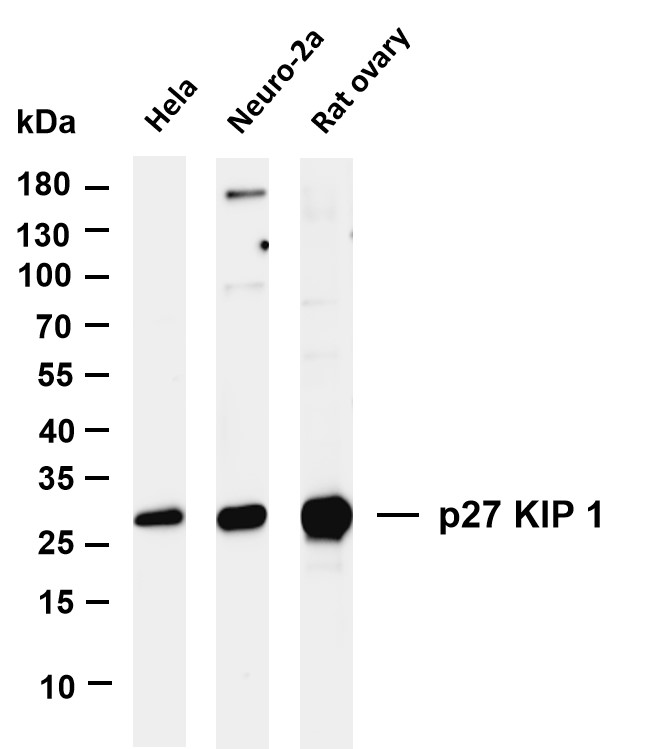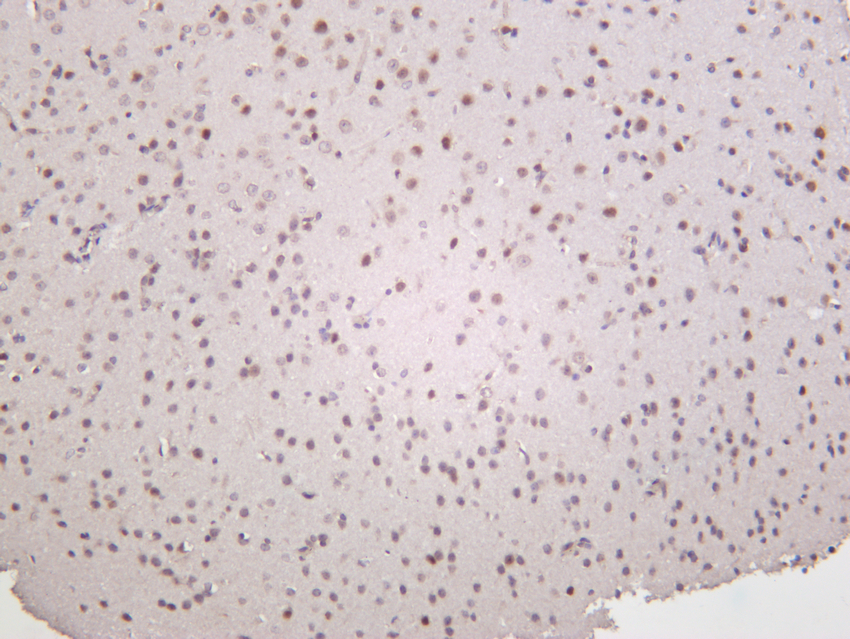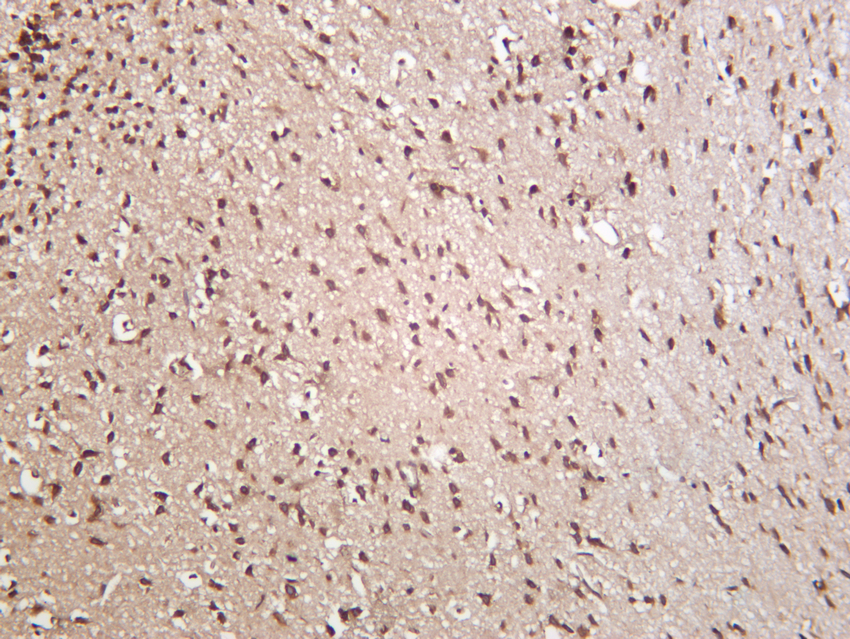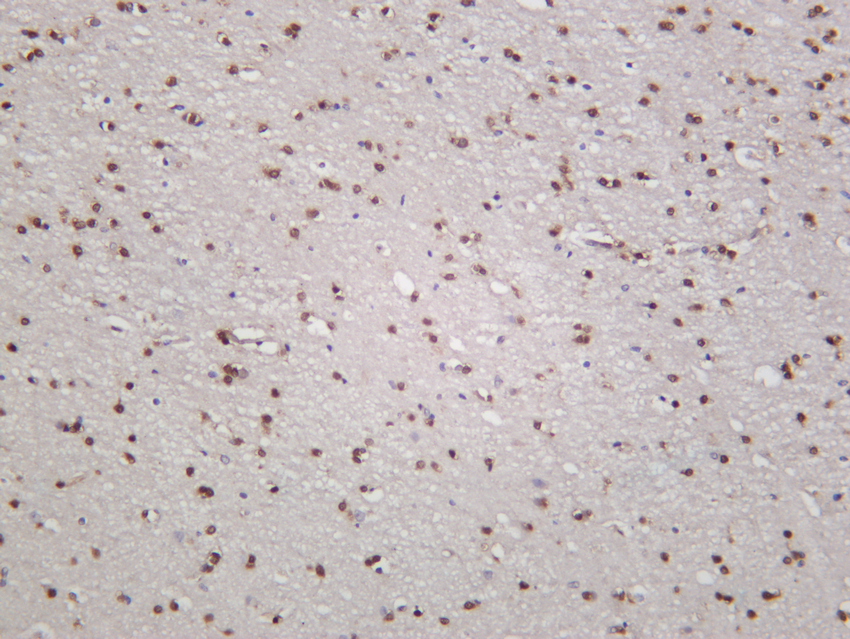p27 KIP 1 (PT0324R) PT® Rabbit mAb
- Catalog No.:YM8191
- Applications:WB;IHC;IF;IP;ELISA
- Reactivity:Human; Mouse; Rat;
- Target:
- p27
- Fields:
- >>Endocrine resistance;>>ErbB signaling pathway;>>HIF-1 signaling pathway;>>FoxO signaling pathway;>>Cell cycle;>>PI3K-Akt signaling pathway;>>AGE-RAGE signaling pathway in diabetic complications;>>Cushing syndrome;>>Measles;>>Human papillomavirus infection;>>Epstein-Barr virus infection;>>Pathways in cancer;>>Transcriptional misregulation in cancer;>>Viral carcinogenesis;>>MicroRNAs in cancer;>>Prostate cancer;>>Chronic myeloid leukemia;>>Small cell lung cancer;>>Gastric cancer
- Gene Name:
- CDKN1B
- Protein Name:
- Cyclin-dependent kinase inhibitor 1B
- Human Gene Id:
- 1027
- Human Swiss Prot No:
- P46527
- Mouse Swiss Prot No:
- P46414
- Specificity:
- endogenous
- Formulation:
- PBS, 50% glycerol, 0.05% Proclin 300, 0.05%BSA
- Source:
- Monoclonal, rabbit, IgG, Kappa
- Dilution:
- IHC 1:200-1:1000,WB 1:1000-1:5000,IF 1:200-1:1000,ELISA 1:5000-1:20000,IP 1:50-1:200,
- Purification:
- Protein A
- Storage Stability:
- -15°C to -25°C/1 year(Do not lower than -25°C)
- Other Name:
- CDKN1B;KIP1;Cyclin-dependent kinase inhibitor 1B;Cyclin-dependent kinase inhibitor p27;p27Kip1
- Molecular Weight(Da):
- 27kD
- Observed Band(KD):
- 27kD
- Background:
- This gene encodes a cyclin-dependent kinase inhibitor, which shares a limited similarity with CDK inhibitor CDKN1A/p21. The encoded protein binds to and prevents the activation of cyclin E-CDK2 or cyclin D-CDK4 complexes, and thus controls the cell cycle progression at G1. The degradation of this protein, which is triggered by its CDK dependent phosphorylation and subsequent ubiquitination by SCF complexes, is required for the cellular transition from quiescence to the proliferative state. Mutations in this gene are associated with multiple endocrine neoplasia type IV (MEN4). [provided by RefSeq, Apr 2014],
- Function:
- disease:Defects in CDKN1B are the cause of multiple endocrine neoplasia type 4 (MEN4) [MIM:610755]. Multiple endocrine neoplasia (MEN) syndromes are inherited cancer syndromes of the thyroid. MEN4 is a MEN-like syndrome with a phenotypic overlap of both MEN1 and MEN2.,domain:A peptide sequence containing only AA 28-79 retains substantial Kip1 cyclin A/CDK2 inhibitory activity.,function:Important regulator of cell cycle progrssion. Involved in G1 arrest. Potent inhibitor of cyclin E- and cyclin A-CDK2 complexes. Positive regulator of cyclin D-dependent kinases such as CDK4. Regulated by phosphorylation and degradation events.,induction:Maximal levels in quiescence cells and early G(1). Levels decrease after mitogen stimulation as cells progress toward S-phase.,miscellaneous:Decreased levels of p27Kip1, mainly due to proteosomal degradation, are found in various epithelial tumors originati
- Subcellular Location:
- Nucleus
- Expression:
- Expressed in kidney (at protein level) (PubMed:15509543). Expressed in all tissues tested (PubMed:8033212). Highest levels in skeletal muscle, lowest in liver and kidney (PubMed:8033212).
Bta-miR-493 Inhibits Bovine Preadipocytes Differentiation by Targeting BMPR1A via the TGFβ/BMP and p38MAPK Signaling Pathways
Roles of eIF3m in the tumorigenesis of triple negative breast cancer. Cancer Cell International Cancer Cell Int. 2020 Dec;20(1):1-16 WB Human 1:500 MDA-MB-231 cell, MDA-MB-436,MCF-10A cell
Sirtuin 7 promotes non‑small cell lung cancer progression by facilitating G1/S phase and epithelial‑mesenchymal transition and activating AKT and ERK1/2 signaling. ONCOLOGY REPORTS Oncol Rep. 2020 Sep;44(3):959-972 WB,IHC Human 1 : 1000,1:100 Lung cancer TMA section A549 cell, H292 cell
ZIC1 acts a tumor suppressor in breast cancer by targeting survivin. INTERNATIONAL JOURNAL OF ONCOLOGY Int J Oncol. 2018 Sep;53(3):937-948 WB Human 1:500 breast tumors MDA-MB-231 cell, SK-BR3 cell
Insulin-like growth factor II mRNA binding protein 3 regulates proliferation, invasion and migration of neuroendocrine cancer cells. International Journal of Clinical and Experimental Pathology Int J Clin Exp Patho. 2017; 10(10): 10269–10275 WB Mouse STC-1 cell
Effects of proanthocyanidins and dialdehyde chitosan on the proliferation and differentiation of bovine myoblast for cultured meat production. Jie Zhu WB Bovine myoblasts
CircSSBP2 acts as a MiR-2400 sponge to promote intramuscular preadipocyte proliferation by regulating NDRG1 MOLECULAR GENETICS AND GENOMICS Zhao Yanqing WB Bovine 1:5000 intramuscular preadipocytes
- June 19-2018
- WESTERN IMMUNOBLOTTING PROTOCOL
- June 19-2018
- IMMUNOHISTOCHEMISTRY-PARAFFIN PROTOCOL
- June 19-2018
- IMMUNOFLUORESCENCE PROTOCOL
- September 08-2020
- FLOW-CYTOMEYRT-PROTOCOL
- May 20-2022
- Cell-Based ELISA│解您多样本WB检测之困扰
- July 13-2018
- CELL-BASED-ELISA-PROTOCOL-FOR-ACETYL-PROTEIN
- July 13-2018
- CELL-BASED-ELISA-PROTOCOL-FOR-PHOSPHO-PROTEIN
- July 13-2018
- Antibody-FAQs
- Products Images

- Various whole cell lysates were separated by 4-20% SDS-PAGE, and the membrane was blotted with anti-p27 KIP 1 (PT0324R) antibody. The HRP-conjugated Goat anti-Rabbit IgG(H + L) antibody was used to detect the antibody. Lane 1: Hela Lane 2: Rat ovary Predicted band size: 27kDa Observed band size: 27kDa

- Mouse brain was stained with anti-p27 KIP 1 (PT0324R) rabbit antibody

- Rat brain was stained with anti-p27 KIP 1 (PT0324R) rabbit antibody

- Human brain was stained with anti-p27 KIP 1 (PT0324R) rabbit antibody



